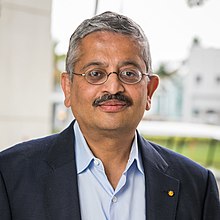Shekhar Bhansali
Shekhar Bhansali | |
|---|---|
 | |
| Division Director of National Science Foundation EECS Program | |
| Alcatel-Lucent Professor and Distinguished University Professor in the Florida International University | |
| Personal details | |
| Born | India |
| Residence | |
| Alma mater | |
| Website | mems https://www.nsf.gov/staff/staff_bio.jsp?lan=sbhansal&org=ECCS&from_org=ECCS |
Shekhar Bhansali is the division director in Electrical, Communication and Cyber Systems (ECCS) at the National Science Foundation. He also serves as an Alcatel-Lucent Professor and Distinguished University Professor in the Florida International University (FIU) Department of Electrical and Computer Engineering.[1] Bhansali’s main research interests are in nanotechnology, biosensors, and microfluidics. He holds 40 patents,[2] has published over 300 publications, and has advised more than 40 Ph.D. students and postdoctoral fellows in research.[1][3] He was elevated to a Fellow of the IEEE in 2023.
Education[edit]
Bhansali received his Bachelor of Engineering (B.E) in metallurgical engineering at Malaviya National Institute of Technology, Jaipur, Rajasthan, India.[3] He then received his Master of Technology (M.Tech) from Indian Institute of Technology Madras and Ph.D. in electrical engineering at RMIT University Australia.[1]
Career[edit]
Shekhar Bhansali began his career in 1995 as a lecturer in the Department of Metallurgical Engineering at RMIT University, Melbourne, Australia. He came to the United States in 1988 and joined CMSM, ECECS Department, University of Cincinnati as a research faculty.[3] In 2000, he joined University of South Florida and led a number of inter-connected interdisciplinary graduate student research and training programs, including NSF-IGERT, NSF’s Bridge to the Doctorate and Alfred P. Sloan Doctoral Fellowship Programs to increase diversity, retention and graduation rates.[4]
Awards[edit]
- Top Scholar Award from FIU in 2014[4]
- William R. Jones Outstanding Mentor Award in 2011 and 2009[4]
- Mentor of the Year Award from Alfred P. Sloan Foundation in 2009[4]
- Outstanding Mentor Award from the McKnight Foundation in 2004[4]
- NSF Career Award in 2003[4]
- In 2018, Bhansali has named as a Fellow of the American Association for the Advancement of Science and the National Academy of Inventors.
- Elevated to IEEE Fellow in 2023 "for contributions to portable real-time sensing devices for continuous monitoring".[5]
Books[edit]
References[edit]
- ^ a b c "Shekhar Bhansali | NSF - National Science Foundation". www.nsf.gov. Retrieved 2020-12-10.
- ^ "Google Patents". patents.google.com. Retrieved 2020-12-10.
- ^ a b c "Curriculum Vitae of Shekhar Bhansali" (PDF). Florida International University.
- ^ a b c d e f "Dr. Shekhar Bhansali". Bio-Mems & Microsystems. Retrieved 2020-12-10.
- ^ "2023 NEWLY ELEVATED FELLOWS" (PDF). IEEE.org.
- ^ "Mems for Biomedical Applications - 1st Edition". www.elsevier.com. Retrieved 2020-12-10.
- ^ Hesketh, Peter J. (2006). Chemical Sensors 7 -and- MEMS/NEMS 7. The Electrochemical Society. ISBN 978-1-56677-510-6.
